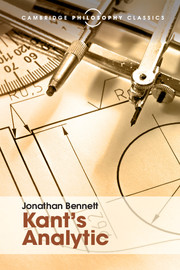Book contents
14 - The refutation of idealism
from Analytic of principles
Published online by Cambridge University Press: 05 July 2016
Summary
The realism argument
Kant has a certain line of argument which, though adumbrated in the Transcendental Deduction in A (see §33 above), appears explicitly only in B, under the heading ‘Refutation of Idealism’. In the Preface to B Kant rightly calls it ‘the only addition, strictly so called’ which he has made to the content of the Critique.
The Refutation of Idealism is Kant's chef d’œuvre of compressed obscurity: no-one could claim that its one brief paragraph constitutes, as it stands, an achieved argument. If we are to take it seriously, we must speculate about what is supposed to be happening in it. Clearly, its target is anyone who denies or casts doubt on the existence of an objective realm; and the opening sentences give an impression of what the line of attack will be:
I am conscious of my own existence as determined in time. All determination of time presupposes something permanent in perception. This permanent cannot, however, be something in me…
This seems to say: ‘According to the first Analogy, a self-conscious being must have experience of something permanent. I shall now show that the latter must be objective or other-than-oneself.’ Although most commentators have taken Kant at his word here, there are powerful reasons for not doing so.
For one thing, the Refutation of Idealism could hold little interest if it presupposed the untruth which is the first Analogy, i.e. if it were a rider saying : ‘…and, furthermore, these sempiternal items must be objective’. Also, such verbal overlaps as it has with the ‘proof’ of the first Analogy pertain to the latter's least comprehensible part—not to the analysis of existence-change but rather to the obscure doctrine that time is permanent and unperceivable. Most important of all: if the Refutation of Idealism presupposes the first Analogy, then the ‘proof’ of the latter must be taken as offering, in support of the conclusion that self-consciousness requires experience of something permanent, an argument which is neutral as to whether the ‘something permanent’ is inner or outer. This is an impossible reading of the first Analogy, which is clearly stated in both editions as a thesis about the division of ‘appearances’, i.e. of the objective realm, into substances and properties.
- Type
- Chapter
- Information
- Kant's Analytic , pp. 215 - 232Publisher: Cambridge University PressPrint publication year: 2016

